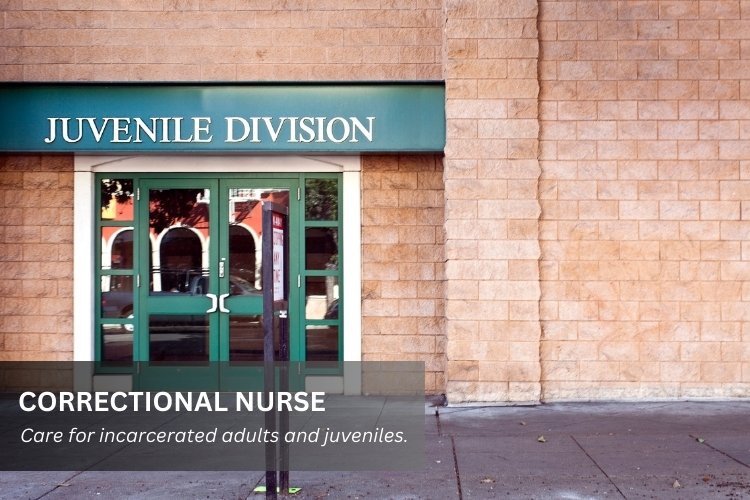Correctional Nurse Career Guide

Correctional nursing is a specialized field that combines elements of healthcare with the criminal justice system, offering unique challenges and rewards. Correctional nurses provide care to a population that is often underserved and face a variety of health issues. This role requires not only a strong foundation in nursing practice but also the ability to navigate a complex environment with compassion and professionalism. Let's delve into the Correctional Nurse specialty, explore their work environment, outline their duties, learn how to become a Correctional Nurse, education requirements, annual salary, and advancement opportunities for this nursing career.
What Is a Correctional Nurse?
A Correctional Nurse is a registered nurse who works within the prison system or juvenile detention centers, providing healthcare to inmates and detainees. These professionals are responsible for assessing patient health problems and needs, developing and implementing nursing care plans, and maintaining medical records. Correctional nurses must be prepared to address a wide range of health issues, from acute injuries to chronic illnesses, and mental health conditions. The role requires adaptability, strong assessment skills, and the ability to work independently in a highly structured environment.
Where Does a Correctional Nurse Work?
Correctional Nurses work in settings that are far removed from traditional healthcare environments, providing necessary medical care in jails, prisons, and detention centers.
The most common workplaces for a Correctional Nurse:
- State prisons
- Federal penitentiaries
- County jails
- Juvenile detention centers
- Immigration detention centers
Working in these environments, Correctional Nurses play a vital role in maintaining the health and well-being of a population that is at higher risk for certain health issues, including infectious diseases, substance abuse disorders, and mental health conditions.
Duties of a Correctional Nurse
The daily responsibilities of a Correctional Nurse are diverse and require a broad set of skills, from clinical expertise to crisis intervention.
The most common duties of a Correctional Nurse:
- Conducting health assessments and screenings for inmates
- Administering medications and treatments
- Responding to medical emergencies within the facility
- Providing health education and counseling
- Coordinating care with other healthcare professionals
Through their dedicated work, Correctional Nurses ensure that inmates receive appropriate care and support, contributing to the overall safety and security of the correctional facility.
How To Become a Correctional Nurse
Becoming a Correctional Nurse requires specific steps, focusing on education, licensure, and gaining relevant experience.
Follow these steps to become a Correctional Nurse:
- Earn a nursing degree (ADN or BSN)
- Obtain a Registered Nurse (RN) license
- Gain clinical nursing experience, preferably in emergency, psychiatric, or public health nursing
- Complete additional training specific to correctional healthcare, if available
- Apply for positions in correctional facilities
This career path offers nurses a chance to make a significant impact in a unique setting, providing care to those who are often marginalized in society.
How long does it take to become a Correctional Nurse?
The journey to becoming a Correctional Nurse typically involves completing a nursing school program, which can take 2-4 years depending on the degree, followed by obtaining licensure as a registered nurse. Gaining the necessary clinical experience to work effectively in a correctional setting may take an additional 1-2 years, making the total time to enter this field approximately 3-6 years.
Education Requirements for a Correctional Nurse
To become a Correctional Nurse, candidates must first complete either an Associate Degree in Nursing (ADN) or a Bachelor of Science in Nursing (BSN) program and then pass the NCLEX-RN to obtain licensure as a Registered Nurse. Some facilities may also require or prefer additional certifications or training in areas such as forensic nursing or mental health nursing.
How Much Does a Correctional Nurse Make?
The salary of a Correctional Nurse can vary depending on factors such as location, experience, and the type of facility. On average, Correctional Nurses can expect to earn between $55,000 and $80,000 annually.
Annual salary for a Correctional Nurse:
- Entry-level Correctional Nurse: $55,000 - $65,000
- Experienced Correctional Nurse: $65,000 - $75,000
- Correctional Nurse in high-demand areas or with advanced certifications: $75,000 - $80,000+
Salaries may be higher in federal facilities or in areas with a higher cost of living.
Correctional Nurse Career Advancement Opportunities
Correctional Nurses have opportunities for advancement into supervisory or administrative roles within the correctional healthcare system. Additional education and certifications, such as in forensic nursing or healthcare administration, can further enhance career prospects and lead to higher positions such as Director of Nursing or Health Services Administrator in a correctional facility.
The Future of Correctional Nursing
The demand for Correctional Nurses is expected to grow as the need for comprehensive healthcare services within correctional facilities continues to rise. With an increasing focus on reducing recidivism through better healthcare, Correctional Nurses will play an increasingly important role in the criminal justice system, offering both challenges and opportunities for professional growth and impact.
Correctional Nursing offers a unique and rewarding career path for nurses seeking to make a difference in a challenging environment. With the right education, skills, and dedication, Correctional Nurses can provide essential healthcare services, improve inmate health outcomes, and contribute to the broader goals of public health and safety.
Last updated: July 20, 2025
References:
- CCHP Certification. National Commission on Correctional Health Care, Professional Certification. Retrieved July 20, 2025.
- Certification Types and Levels. American Correctional Association, Professional Development. Retrieved July 20, 2025.
- Registered Nurses. Bureau of Labor Statistics, U.S. Department of Labor. Occupational Outlook Handbook. Retrieved July 20, 2025.
- Correctional Nursing. Johnson & Johnson, Nursing Careers. Retrieved July 20, 2025.
- What Is a Correctional Nurse. Indeed, Career Guide. Retrieved July 20, 2025.
- Correctional Nurse. PayScale, Browse Jobs by Industry. Retrieved July 20, 2025.
